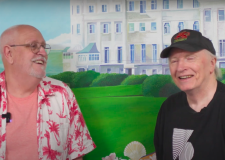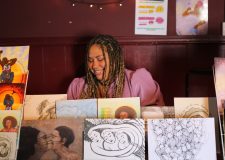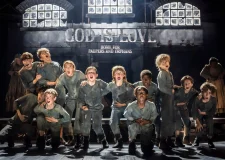Lucy Nordberg
Local writer and producer Lucy Nordberg speaks to Deborah Espect about how she weaves her passion for theatre and poetry into her films.
Lucy Nordberg is a writer and producer in film and theatre, and co-founder of the company Moving Pictures Theatre (MPT). Most recently, Time and Tide, her trilogy of short films, is showing at festivals around the world and has won awards including Best UK Short Film at the London Independent Film Festival and Best International Short Film at the Idyllwild International Festival of Cinema.
You are the co-founder of Moving Pictures Theatre. How and why did you create this very original company?
I formed Moving Pictures Theatre with my co-producer Marc Green in order to film theatre productions in interesting and historic locations, using an epic, cinematic style. I met Marc after a run of a play I’d written had just finished at Craigcrook Castle in Edinburgh – a contemporary take on King Arthur, using dramatic blank verse in modern language. I was thinking – where to take this next, how to grow it? I love the idea of finding the perfect settings to fit a play, but site-specific locations are limited in terms of the amount of audience you can get in to sustain a large-scale production, and some would only be available to use for a very short run.
So Marc and I planned to produce both new and classic works in locations that would have hosted productions in the past – for example, Middle Temple Hall in London, where plays were performed in Elizabethan times – and filming them. That way, these exclusive locations are opened up to new audiences, who can watch from anywhere.
As well as building towards this, we’re also looking at more conventional film – but always with a slant on location and bringing classic styles to a modern audience. We’re just at the beginning of the journey, completing our first short film content and also workshops with actors to lead to bigger productions. We’ve also got a residence at Brighton tech hub Fusebox, to develop our work in immersive 360 film making.
Your most recent project, Time and Tide, starring the fabulous John Locke, is currently enjoying a very successful festival run. How did it all come about?
We planned to try out dramatic filmed poetry, focussing on the actor’s performance, in interesting locations. A 360 filmmaker we were working with told us about a friend of his who runs an arts centre on a lightship – a lighthouse at sea – on the Thames in Kent. We thought this would be the perfect setting to dramatise one of my poems, The Last Lighthouse Keeper, which is about the keeper’s profession from the invention of the lighthouse, to eventual redundancy. John Locke came on board (literally!) with the project. John’s a champion of independent filmmakers and has been a great support throughout.
It’s part of a trilogy. What are the other two films?
We were very fortunate that we were able to cast Greta Scacchi in The Arena, directed by Justin Spray and filmed on West Wittering Beach, and Samuel West in Homecoming, directed by Jonathan Stow and filmed in the Theatre Royal in Brighton. The Arena tells the tale of a gladiator fighting for his life, while his mother looks on, recalling happier times. Homecoming is about an actor returning to the theatre after a long absence, to take the role of Odysseus – who finds that after an epic journey home, he faces new trials to overcome. We’re really pleased Greta and Sam – and everyone else involved in the productions! – took a chance on us for this, because we were new to the film world.
For The Last Lighthouse Keeper, as an experiment and separate project, we also filmed it in immersive 360, viewable in a VR headset. We built on this by filming another short as both a normal film and as immersive piece, the Mirror – set at the historic Preston Manor in Brighton. New filmmaking techniques are often thought of as futuristic, but we saw this as an opportunity to immerse the viewer into a past time – a period drama can be powerful if the viewer can fully enter that world.
What draws you to site-specific stories?
I think it’s the element of atmosphere, there are all these locations that have the potential to host performances as well as just being preserved to look at. I also work as a business researcher for architects, and before that, I worked in a very different role in the financial side of the construction industry. So for many years I’ve been thinking about buildings, the built environment in general, how we use and inhabit different spaces. And opening them up, of course – taking something over for a performance makes otherwise closed-off places accessible. I’m quite nosey, it’s a way in!
What challenges have you faced, filming in those locations?
You have to adapt, as there are restrictions, especially with historic items – we’re not really about going in and moving everything around to fit the vision. We cheat a bit though, in that we pick the place that best fits the story with the minimum effort! Our specific challenge is to make what’s there look as good on screen as it ‘feels’ to be there, without changing it.
Do you have plans for any more site-specific films?
We’ve got quite a few full-length ones ready to go, a mix of new and classic work paired with sympathetic locations. We’ve also got a modern one in pre-production, where each scene will be in a different location, which will be filmed as a normal film but we’ll also complete an immersive version in 360.
What would be your dream location? And your dream performer to work with?
I think our dream location would be somewhere like St Mark’s Square in Venice. I’m going to chicken out on the dream performer question as I can honestly say that the calibre of the performers we worked with in the trilogy were pretty much where we’d like to be, we just want to build on that. So more of the same kind of named actors, when we move onto projects with larger casts, would be great!
During lockdown, you launched the From Home project. Tell us about that…
Just before lockdown, Marc and I met Tom Ottway from Language Umbrella Media, who for many years had researched the idea of ‘home’ at the University of Sussex. We all felt the subject was ideal for a piece of immersive theatre or interactive media – Tom already had a wealth of audio material from interviews about home. When lockdown hit, this project seemed very relevant, so we asked the public to send in short videos of their experiences of home at this time. Responses came in from all around the world – they were hugely varied.
We held our first event at the Brighton Digital Festival. Using a headset, visitors entered a virtual environment – designed by Chris Chowen and Chandler Dagg at Fusebox – and made their way through a series of rooms which were scanned from real-life locations, including participants’ homes and performance spaces such as the Attenborough Centre for Creative Arts. In their virtual journey, they explored the embedded sound art and videos. On the launch night, some of the contributors to the project who were actors and musicians performed live. We’re now looking at new ways to expand on the content and explore the idea of home more widely.
What are you working on now?
As well as working on the films I’ve mentioned, and the From Home project, we’re also producing a series of music videos by the band Art-O-Matic, who write songs about art and architecture. Thanks to lead singer David Stephenson’s many connections to the art world, we’ve got some exciting locations for those, and we’re also producing immersive 360 videos alongside them.
Can you tell us about your background as a filmmaker?
I studied English and Drama at Kent University – I chose to go there because I really wanted to have a chance to learn as much about writing as possible, and at the time it was possible to choose courses in poetry, prose and drama as part of the degree. Film was the only thing missing! So I studied that on my own. I’ve also produced theatre – the live element of theatre is exciting, but temperamentally I think I’m drawn to film as the performance is captured – you can work on the production and then it can be released and seen across time. My co-producer Marc comes mainly from a fine art, photography and graphic arts background, so he’s also moved into film from another path. We’ve surrounded ourselves with people that really know what they’re doing in film, so we listen and learn from them to find the best ways to achieve our vision.
You can find out more about Lucy and her work on her website, Facebook and Instagram pages.





















